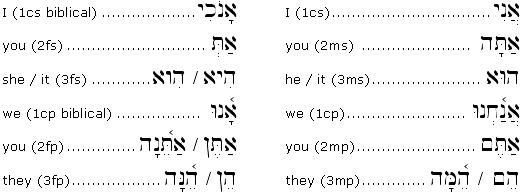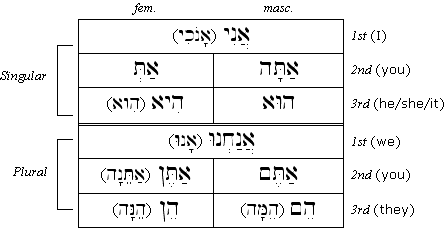|
|
||||||||||||||||||||||
 |
||||||||||||||||||||||
|
Learn Hebrew |
||||||||||||||||||||||
 |
||||||||||||||||||||||
|
Audio Tanakh |
||||||||||||||||||||||
 |
||||||||||||||||||||||
|
Hebrew Training |
||||||||||||||||||||||
|
Section Vocabulary |
|||||||||||||||||
 |
|||||||||||||||||
|
Subject Pronoun Paradigm The lexical form for the Hebrew personal pronoun is always the 3rd person masculine singular (3ms) form (hu). Note that this paradigm must be memorized. Forms shown in parentheses are alternate spellings found in the Hebrew scriptures and also should be memorized. Note also that the 1st person forms are the same for either gender (designated by 1cs or 1cp (1st person common singular, 1st person common plural)). These personal pronouns are sometimes referred to as "subject" or "independent" pronouns since they 1) function as subjects in clauses (where an implied verb "to be" is implied), and 2) they stand alone without further inflections (i.e., they are independent). Examples In this example, the 1cs pronoun (ani) functions as the subject and stands in apposition to the predicate noun "LORD". We supply the linking verb "is" and translate: "I am the LORD." In this example, the 2ms personal pronoun (attah) functions as the subject term and is connected to the predicate noun haIsh using the linking verb "is." In the example above, the 3ms personal pronoun (hu) is the subject of the clause. Note that the adjective tov modifies melekh in the predicate of the clause. Note further that the pronoun agrees with the predicate noun in gender and number. In this example, the 1cp pronoun (anachnu) functions as the subject of the clause, even though it appears after the predicate noun achim. In Hebrew, the word order does not matter as much as it does in English and other languages.  In these examples note that the pronoun may appear before or after the adjective in a clause. Note also that the adjective will be inflected to agree with the pronoun in gender and number. In the example above, notice again that though the predicate adjective ivri appears before the subject pronoun, the clause is still translated "I am Hebrew." The "Extra" Pronoun In short noun sentences, personal pronouns may appear between the two other nouns in the sentence. For example:  In these cases it is not necessary to translate these pronouns (though it is optional, of course - you could translate the first example as "The father, he is the king," and the second as "The Torah, it is truth," but it is simpler to leave them untranslated in English). The "Reflexive" Personal Pronoun A reflexive personal pronoun refers back to another personal pronoun as its antecedent with which it agrees in gender and number: I myself have sworn... You youself have said... He himself shall speak... We ourselves have been told... In Hebrew, this form of expression is normally communicated using the personal pronoun in conjunction with a verb, for emphasis. (See the section on Verbs for more information.) Section Exercises
|
|||||||||||||||||
|
Hebrew for Christians |
|||||||||||||||||
|
|||||||||||||||||
